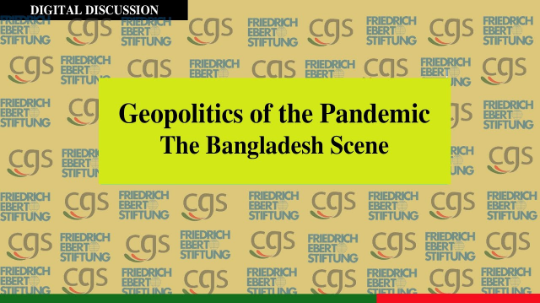Digital Discussion on Geopolitics of the Pandemic: The Bangladesh Scene
08 May 2021
Digital Discussion on
Geopolitics of the Pandemic: The Bangladesh Scene
“This is the kind of situation that Bangladesh is in with respect to the geopilitical situation and what will be the decision, as I said unfortunately the absence of inclusive process have limited input of Bangladesh in decision making process, but the government hopefully will be open to listen to it”- distinguished professor of Illinois State University, USA, Dr. Ali Riaz had stated in a webinar- “Geo-politics of the pandemic: The Bangladesh Scene”, organized by the Centre for Governance Studies on Saturday, 8th May. He also suggested, with that change, Bangladesh’s policy making needs to be realigned.
The distinguished participants of the webinar were- The Resident Representative of Friedrich-Ebert-Stiftung (FES) Bangladesh Felix Kolbitz, Executive Director of the Centre for Policy Dialogue Dr. Fahmida Khatun, Professor Amena Mohsin of Department of International Relations of the University of Dhaka, Secretary of Shujan Dr. Badiul Alam Majumdar and former Election Commissioner Brig. Gen. Dr. M. Shakhawat Hossain (Retd). The webinar was moderated by the Professor of Development Studies of University of Dhaka and Senior Fellow of CGS Dr. Asif Shahan.
The first speaker was Felix Kolbitz who expressed his gratitude towards everyone and tried to portray a picture of the activities of Friedrich-Ebert-Stiftung (FES) and its contribution to develop the socio-economic sector in Bangladesh. In this regard, this organization have been organizing various seminars, trainings and policy-dialogues in Bangladesh. He stated that the pandemic has brought about massive changes in the socio-economic as well as political aspect of the country. Therefore, with the invitation from FES, Professor Dr. Ali Riaz has published a comprehensive research paper on the possible solution and policies that could be taken up by Bangladesh to continue developing during this crisis situation.
The key-note speaker of the webinar was Professor Dr. Ali Riaz. He tried to discuss about the summary of his research paper. He pointed out how the pandemic has been affecting the world for more than a year and Bangladesh being a part of it as well, as a result there is a change in the geo-political aspect of the world. He talked about four main elements while discussing the current scenario- inherent weakness of global, questioning the nature of the globalization, disruption of supply-chain as a new order of integration would be thought out, public health infrastructure question came up and the fourth element that came up was what would be the community cost. In his opinion, considering the external relations of Bangladesh, the country has to deal with two things- economic recovery plan and governance. He also mentioned, even though the relation between Bangladesh and USA is steady, we’re witnessing some China-leaning. In case of economic and strategic sense China will be more significant in the coming years for Bangladesh in his opinion. He places government as the principal actor as the government takes the economic policies. He has criticized the last budget taken up by the government as he didn’t consider it viable in the time of the pandemic. The second actor is the business sector as he mentioned the sector’s influence in policy making and politics has increased. He also considered the opposition party as an actor though the efficiency of such party in our country is absent. Regional actors could be India and China. He discussed on how the regional actors are either of these two countries because of the absence of USA in current scenario. He has emphasized on the importance of equidistance to maintain a steady relation with all the countries but also he thinks of a possibility of radicalization.
Professor Amena Mohsin agreed with Dr. Ali Riaz on the context of Bangladesh maintaining an equidistance with the outside world and ruling out the possibility of turning radical. She thinks given the rising economic and geographical situation, Bangladesh is in a critical state with India, China and USA.
Dr. Fahmida Khatun emphasized on the importance of cooperation between regions. She had pointed out how during the pandemic, countries have resorted within their nationalistic view. She also stated that as though the government has taken monetary measures, that measure hasn’t been adequate, because it is mostly loan basis and hasn’t been looked from a broader perspective. She suggested that the budget has to be not just for health sector, but other arenas has to be in mind because of the future uncertainty.
Dr. M. Shakhwat Hossain pointed out the collapse of the public health system and situation in the country. He discussed about the failure in regards to the vaccine policy and the dependency of Bangladesh on just one country. He talked about the Rohingya issue and the good relation between Myanmar and China and also expressed his uncertainty about the relation between Myanmar and Bangladesh in this regard after the pandemic.
Dr. Badiul Alam Majumdar talked about the importance of cooperation in tackling the COVID-19 situation. He also pointed out the failures of organizations like World Bank in monitoring governments. He emphasized on the need of political realignment and popular legitimacy to deal with Hefajot-e-islam.
Former State Minister, Ministry of Foreign Affairs Abul Hasan Chowdhury also participated in this open discussion and he had emphasized on the importance of “Friendship towards all and malice towards none” and stated that the equidistance scenario is important and Bangladesh to follow a realistic view that isn’t of the offensive kind for economic development.
Moreover, Former Ambassador M. Shafiullah has expressed his concern about Bangladesh’s capability in maintaining a steady relation with both India and China and said he doesn’t believe Bangladesh can maintain an equidistance with all the countries rather, it should follow a policy to protect its sovereignty.
Webinar Facebook link: https://fb.watch/5m90XO3XRQ/
Webinar Youtube link: https://youtu.be/vVr7KBqBMnI
